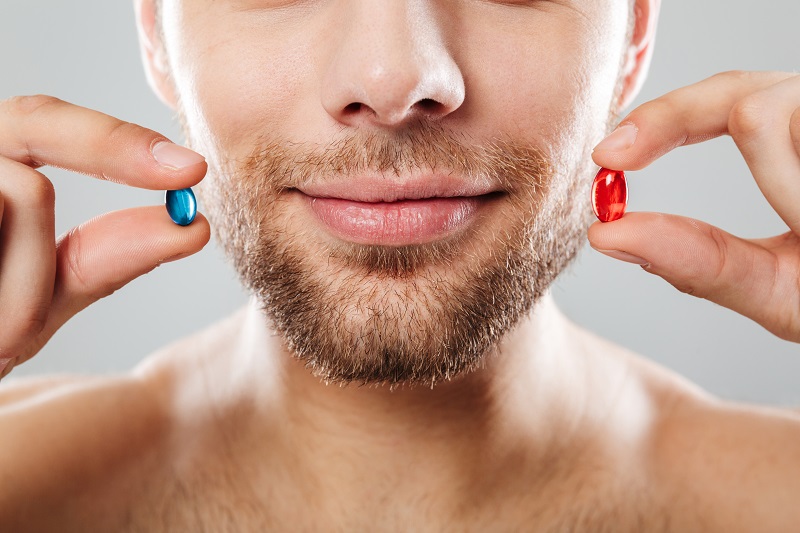Vitamin D and K are among the fat-soluble vitamins. Vitamin K is divided in nature into two subgroups: vitamin K1 (phylloquinone) and the vitamin K2 group (menaquinone – MK). Sources of menaquinone are animal products: eggs, meat, cheese, butter. For the most part, vitamin K2 is a fermentation product of the capable bacteria in food, as well as gut bacteria. A particular source of vitamin K2 in the form of MK-7 (the best absorbed) is natto-fermented soya beans, often consumed in Asian countries. K2 MK-7 has a beneficial effect on disorders such as:
- osteoporosis
- circulatory system diseases
- tumours
- Alzheimer’s disease
- diabetes and peripheral neuropathy
- and on various inflammatory conditions.
Vitamin D (calcitriol, cholecalciferol) mainly comes from skin synthesis and supplementation is recommended for people of all ages during autumn and winter. In the body, it acts as a hormone with many properties, such as:
- regulation of the calcium-phosphorus balance and building strong bones
- regulation of the immune system
- neuroprotective and antidepressant properties
- cardiovascular protection
- improvement of insulin sensitivity
- anticancer and anti-inflammatory properties

Synergism of vitamin D and K2
Vitamin D and K2 are often included together in dietary supplements, as they act synergistically. The active form of vitamin D3 with vitamin K are needed for the synthesis of osteocalcin (a calcium transporter), so taking these vitamins is essential for bone health. Calcitriol increases calcium absorption in the gut, and MK-7 is the most effective cofactor for the carboxylation of proteins involved in inhibiting arterial calcification, i.e. it aids the distribution of calcium to the appropriate sites in the body.
Effect of vitamin K2 on immunity
A study by Visser M. et al. linked the relationship between a high prevalence of vitamin K deficiency in patients with severe COVID-19 and increased inflammation, elastic fibre degradation and poor clinical outcomes. Vitamin K-dependent activation of matrix Gla protein (MGP) is a potent protective factor for soft tissues against various injuries, such as mineralisation and degradation, and plays an important role in suppressing inflammation-induced vascular and pulmonary tissue damage during SARS CoV-2 infection. Menaquinone can also inhibit IL-6 production, either via activation of immune system inhibitory proteins, growth arrest specific gene 6 (Gas6) and protein S, or by suppressing NFκB signalling. Elevated IL-6 levels are precisely indicative of the severity of COVID-19. In contrast, elastic fibres are essential components of dynamic tissues such as the lungs and arteries, so their degradation is not advisable.
There are reports that MK-7 has nutritional properties for both the host and the gut microbiota. Immune status is largely influenced by the gut flora, so one might suspect that providing menaquinone with diet or supplementation would support the beneficial bacteria, thereby improving the body’s immune status. In addition, the compound has been shown to have anti-inflammatory and antioxidant effects, protecting the body from oxidative stress. K2-7 inhibits pro-inflammatory mediators such as IL-1α, IL-1β and TNF-α. An excessive inflammatory response accompanies acute respiratory infections, including COVID, so compounds with anti-inflammatory properties are helpful to make the disease go more smoothly.
Effect of vitamin D on immunity
The active form of vitamin D influences many factors of the immune system, both innate and acquired. Vitamin D metabolising enzymes and their receptors (VDRs) are present in many cell types, including various immune cells, including antigen-presenting cells, T and B lymphocytes and monocytes. They are stimulated by pathogen activity in the body. Due to the presence of calcitriol, there is an increased production of antimicrobial and antiviral peptides (cathelicidin and β-defensin 2) and neutralising antibodies. In addition, the compound reduces inflammation and oxidative stress, mainly by suppressing inflammatory cytokines.
Sufficient vitamin D in the body significantly reduces the risk of chronic disease, infection (and its severe passing) and mortality from any cause. It is suggested that, in order to maintain optimal health, the minimum serum 25(OH)D concentration should be 50 ng/ml for people of all ages.

When to use vitamin D and K2 supplementation
It has been suggested that many people may have subclinical menaquinone deficiency, which interferes with calcium metabolism. The duo of these vitamins is worth taking for osteoporosis, cardiovascular conditions and diabetes. There are various preparations with K2 on the market, including synthetic MK-4, which requires higher doses in use. For this reason, it is better to choose a form of MK-7, of natural origin, with excellent absorption and ability to accumulate in the blood. As both vitamins are fat-soluble, an oil capsule formulation would be a better choice.
Bibliography:
Jarosz M., Rychlik E., Stoś K. i wsp.: Normy żywienia dla populacji Polski i ich zastosowanie., PZH, 2020
Visser MPJ, Dofferhoff ASM, van den Ouweland JMW i wsp.: Effects of Vitamin D and K on Interleukin-6 in COVID-19. Front Nutr. 2022 Jan 17;8:761191.
Wimalawansa SJ. Infections and Autoimmunity-The Immune System and Vitamin D: A Systematic Review. Nutrients. 2023 Sep 2;15(17):3842.
Zhang Y, Liu L, Wei C, Wang X. i wsp.: Vitamin K2 supplementation improves impaired glycemic homeostasis and insulin sensitivity for type 2 diabetes through gut microbiome and fecal metabolites. BMC Med. 2023 May 5;21(1):174.
Wawer I., Kompendium suplementów diety. 2023, Medyk
Jadhav N, Ajgaonkar S, Saha P. i wsp.: Molecular Pathways and Roles for Vitamin K2-7 as a Health-Beneficial Nutraceutical: Challenges and Opportunities. Front Pharmacol. 2022 Jun 14;13:896920.

